J
John McIlroy
Guest
Toyota has unveiled an all-new version of its flagship large off-road SUV, the Land Cruiser, in the Middle East.
Called the Toyota Land Cruiser 300, the new model is the first wholly fresh iteration of Toyota’s iconic go-anywhere vehicle since the 200 Series was introduced back in 2007. The 300 gets a different platform called GA-F, new V6 engines, a 10-speed automatic gearbox and redesigned suspension.
The looks are typical Land Cruiser - which is to say that the car is imposing and robust, and clearly designed with off-road approach and departure angles in mind. The cabin gets a more sophisticated look, with a widescreen infotainment system incorporating smartphone integration, and comes with claims of more appealing plastics and finishes.
The new vehicle marks the first time that Toyota’s TNGA platform - the modular architecture that forms the basis of most of the firm’s models these days - has been used to support a body-on-frame car. The two new six-cylinder engines, both twin-turbocharged, are a 3.5-litre petrol and a 3.3-litre diesel; both are claimed to offer better driveability and efficiency than a conventional V8.

Toyota Land Cruiser - rear static
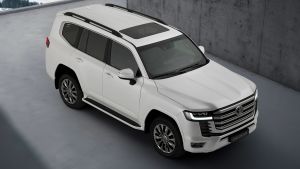
Toyota Land Cruiser - above

Toyota Land Cruiser - side

Toyota Land Cruiser - Land Cruiser badge

Toyota Land Cruiser - front
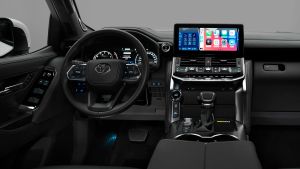
Toyota Land Cruiser - dash
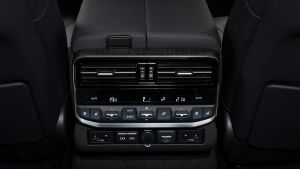
Toyota Land Cruiser - rear controls

Toyota Land Cruiser - rear
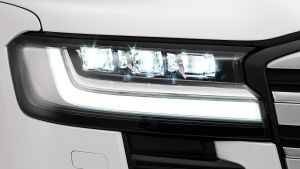
Toyota Land Cruiser - front light
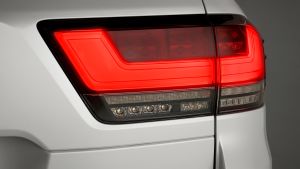
Toyota Land Cruiser - rear light

Toyota Land Cruiser - grille
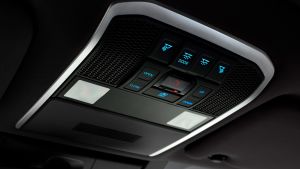
Toyota Land Cruiser - interior detail
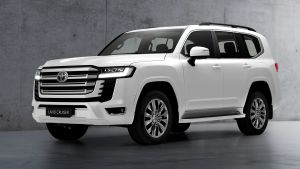
Toyota Land Cruiser - front static

Toyota Land Cruiser - infotainment

Toyota Land Cruiser - rear seats
Toyota has not issued any performance or efficiency figures, but the firm says that when paired with the new 10-speed auto gearbox, the motors deliver economy and CO2 emissions gains of around 10 per cent over the outgoing Land Cruiser. Weight-saving measures help with this too, since the new model is around 200kg lighter than its predecessor.
The Land Cruiser 300 is designed to be capable enough off road to justify its nameplate, while also delivering an easier driving experience on both rough terrain and smooth paved roads. It has what Toyota is calling a ‘world-first Electronic Kinetic Dynamic Suspension System’ - likely to be a development of the old car’s technology but now using processing power to help the system to adapt more quickly to changing surfaces.
A camera-based terrain monitoring system will allow occupants to see the road conditions surrounding the vehicle, while the vehicle’s own technology will judge the quality of the road surface and change the car’s operating mode accordingly.
The Land Cruiser 300 is due on sale later this summer, but the choice of debut venue, Dubai, is no coincidence. That’s because the car is designed for customers outside Western Europe. Toyota has no plans to introduce it here, particularly since the firm recently introduced the much more fuel-efficient Highlander hybrid as a flagship to its European SUV line-up.
Would you like to see the new Toyota Land Cruiser 300 come to the UK? Let us know in the comments section...
Continue reading...
Called the Toyota Land Cruiser 300, the new model is the first wholly fresh iteration of Toyota’s iconic go-anywhere vehicle since the 200 Series was introduced back in 2007. The 300 gets a different platform called GA-F, new V6 engines, a 10-speed automatic gearbox and redesigned suspension.
- SEE MORE Best large SUVs on sale 2021
The looks are typical Land Cruiser - which is to say that the car is imposing and robust, and clearly designed with off-road approach and departure angles in mind. The cabin gets a more sophisticated look, with a widescreen infotainment system incorporating smartphone integration, and comes with claims of more appealing plastics and finishes.
The new vehicle marks the first time that Toyota’s TNGA platform - the modular architecture that forms the basis of most of the firm’s models these days - has been used to support a body-on-frame car. The two new six-cylinder engines, both twin-turbocharged, are a 3.5-litre petrol and a 3.3-litre diesel; both are claimed to offer better driveability and efficiency than a conventional V8.

Toyota Land Cruiser - rear static

Toyota Land Cruiser - above

Toyota Land Cruiser - side

Toyota Land Cruiser - Land Cruiser badge

Toyota Land Cruiser - front

Toyota Land Cruiser - dash

Toyota Land Cruiser - rear controls

Toyota Land Cruiser - rear

Toyota Land Cruiser - front light

Toyota Land Cruiser - rear light

Toyota Land Cruiser - grille

Toyota Land Cruiser - interior detail

Toyota Land Cruiser - front static

Toyota Land Cruiser - infotainment

Toyota Land Cruiser - rear seats
Toyota has not issued any performance or efficiency figures, but the firm says that when paired with the new 10-speed auto gearbox, the motors deliver economy and CO2 emissions gains of around 10 per cent over the outgoing Land Cruiser. Weight-saving measures help with this too, since the new model is around 200kg lighter than its predecessor.
The Land Cruiser 300 is designed to be capable enough off road to justify its nameplate, while also delivering an easier driving experience on both rough terrain and smooth paved roads. It has what Toyota is calling a ‘world-first Electronic Kinetic Dynamic Suspension System’ - likely to be a development of the old car’s technology but now using processing power to help the system to adapt more quickly to changing surfaces.
A camera-based terrain monitoring system will allow occupants to see the road conditions surrounding the vehicle, while the vehicle’s own technology will judge the quality of the road surface and change the car’s operating mode accordingly.
The Land Cruiser 300 is due on sale later this summer, but the choice of debut venue, Dubai, is no coincidence. That’s because the car is designed for customers outside Western Europe. Toyota has no plans to introduce it here, particularly since the firm recently introduced the much more fuel-efficient Highlander hybrid as a flagship to its European SUV line-up.
Would you like to see the new Toyota Land Cruiser 300 come to the UK? Let us know in the comments section...
Continue reading...
